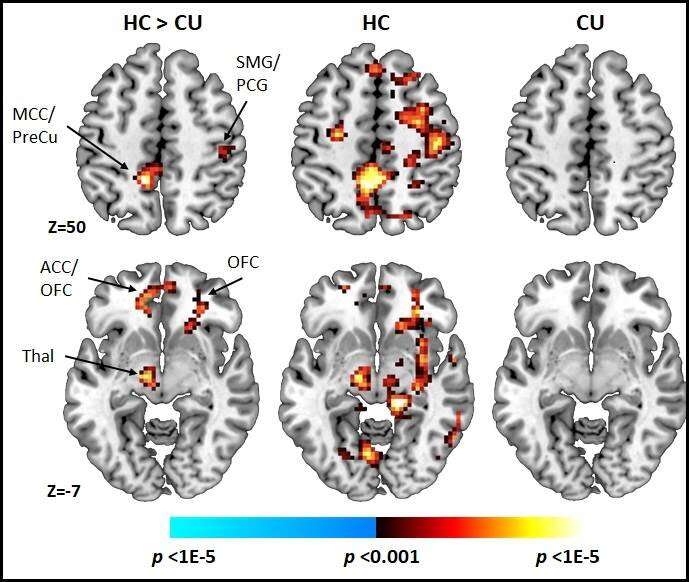Early and regular cannabis use by youth is associated with alteration in brain circuits that support cognitive control

The development of neural circuits in youth, at a particularly important time in their lives, can be heavily influenced by external factors—specifically the frequent and regular use of cannabis. A new study in the Journal of the American Academy of Child and Adolescent Psychiatry (JAACAP) reports that alterations in cognitive control—an ensemble of processes by which the mind governs, regulates and guides behaviors, impulses, and decision-making based on goals are directly affected.
The researchers found that these brain alterations were less intense in individuals who recently stopped using cannabis, which may suggest that the effects of cannabis are more robust in recent users. Additional findings from the study also suggest greater and more persistent alterations in individuals who initiated cannabis use earlier, while the brain is still developing.
"Most adults with problematic substance use now were most likely having problems with drugs and alcohol in adolescence, a developmental period during which the neural circuits underlying cognitive control processes continue to mature," said lead author Marilyn Cyr, Ph.D. "As such, the adolescent brain may be particularly vulnerable to the effects of substance use, particularly cannabis—the most commonly used recreational drug by teenagers worldwide," added the postdoctoral scientist in the Division of Child and Adolescent Psychiatry at the New York State Psychiatric Institute, Vagelos College of Physicians & Surgeons, Columbia University, New York.
The findings are based on functional magnetic resonance imaging (fMRI) data acquired from 28 adolescents and young adults (aged 14-23 years) with significant cannabis use and 32 age and sex-matched non-using healthy controls. Participants were scanned during their performance of a Simon Spatial Incompatibility Task, a cognitive control task that requires resolving cognitive conflict to respond accurately.
The authors also examined the degree to which fluctuations in activity in relation to conflict resolution is synchronized across the different regions comprised in this frontostriatal circuit (that is, to what extent are regions functionally connected with each other). Although circuit connectivity did not differ between cannabis-using and non-using youth, the research team found an association between how early individuals began regularly using cannabis and the extent to which frontostriatal regions were disrupted, suggesting that earlier chronic use may have a larger impact on circuit development than use of later onset.
"The present findings support the mission of the Adolescent Brain and Cognitive Development study, a longitudinal study aimed at understanding the developmental trajectory of brain circuits in relation to cannabis use," said Dr. Cyr. "In addition, these findings are a first step towards identifying brain-based targets for early interventions that reduce addiction behaviors by enhancing self-regulatory capacity.
"Given that substance use and relapse rates are associated with control processes, interventions based on neural stimulation, such as transcranial magnetic stimulation (TMS), and behavioral interventions, such as cognitive training, that specifically target the brain circuits underlying these control processes may be helpful as adjunct intervention strategies to complement standard treatment programs for cannabis use disorder."
More information: Marilyn Cyr et al. Deficient Functioning of Frontostriatal Circuits During the Resolution of Cognitive Conflict in Cannabis-Using Youth, Journal of the American Academy of Child & Adolescent Psychiatry (2018). DOI: 10.1016/j.jaac.2018.09.436


















